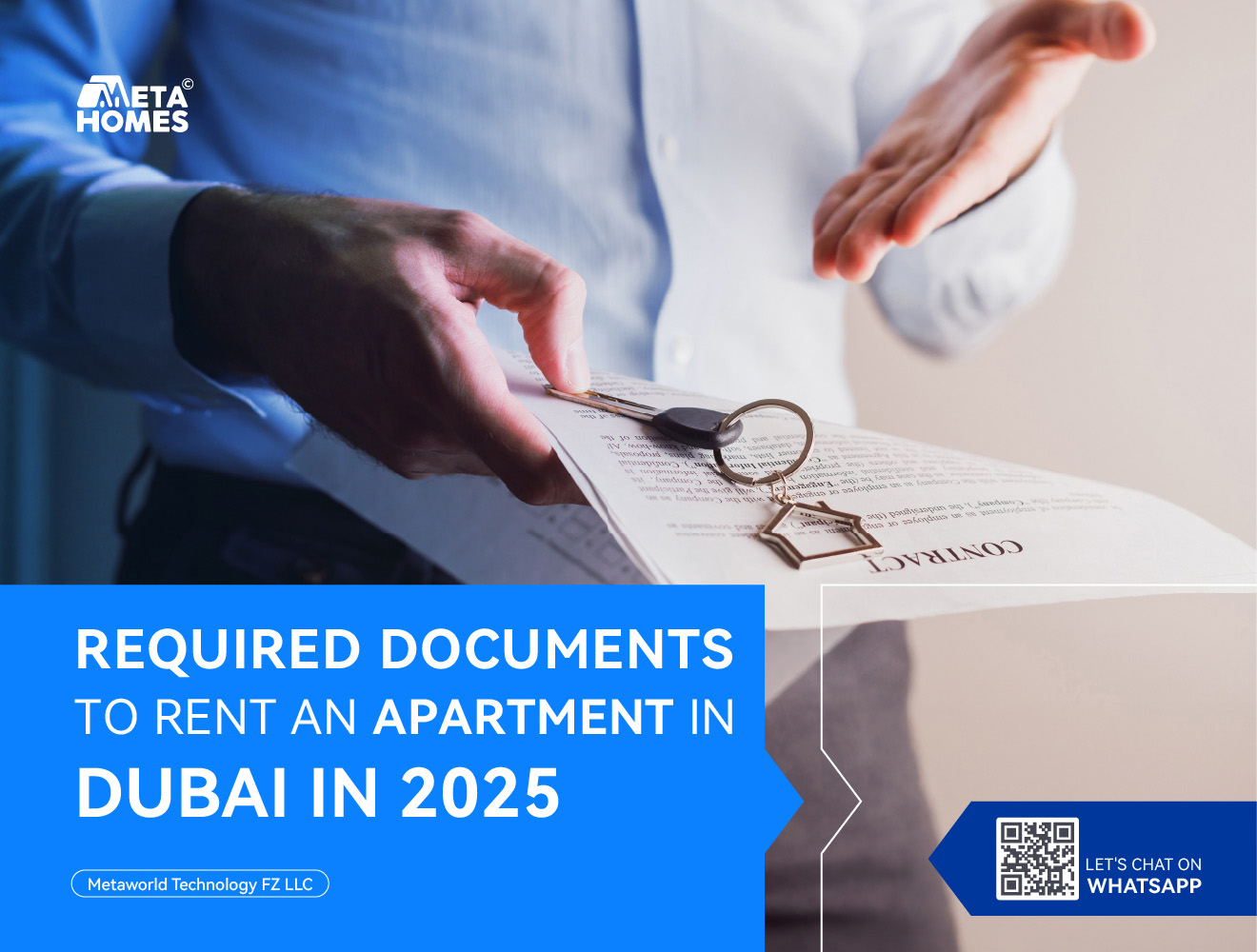
Rental agreements in Dubai are governed by laws and standards set by the Dubai Land Department.
This has made the process transparent and secure for both landlords and tenants. Preparing the right documents is key, whether you are new to Dubai or have lived here for a while.
Every landlord may have small variations, but certain documents are almost always required.
Most transactions are done through reputable real estate agents and platforms that list verified properties on MetaHomes, a leading real estate portal in the UAE.
Why Documentation is Important in Dubai to Rent an Apartment
Ensure you have all the necessary documents before you start looking for an apartment for rent in Dubai.
Having these documents ready will not only speed up the process but also reduce the chances of delays and complications.
This section explains why documentation is crucial:
- Legal Compliance: Documents ensure the rental agreement complies with the Dubai government and Dubai Land Department regulations.
- Identity Verification: Essential identification documents like your passport and Emirates ID confirm your legal status in the country.
- Financial Security: Documents like security deposit receipts and bank-issued post-dated cheques guarantee that both parties adhere to the financial terms of the lease.
- Transparency: Signing a tenancy contract and completing Ejari registration formalizes the agreement. This process helps safeguard both the tenant and the landlord from potential future disputes.
Required Documents to Rent an Apartment in Dubai
Here are a few documents required to rent flats in Dubai:
1. Clear Copy of Your Passport
Your valid passport is the most important identification document when renting an apartment. It confirms your identity and nationality.
Why: Required for identification and legal verification during the lease signing process.
Tip: Ensure the copy is clear, legible, and has your photo and personal details page.
2. UAE Residence Visa Copy
If you are an expatriate, a copy of your valid UAE residence visa is necessary.
Purpose: Confirms your legal right to reside in the United Arab Emirates.
Tip: Check that your visa is active, as expired visas may cause issues with landlords and agencies.
Tip: Make sure your Emirates ID is in good condition and the copy you provide is clear and up to date.
3. Payment-Related Documents
Renting an apartment in Dubai involves several payment-related commitments:
Security Deposit:
- Standard Practice: In Dubai, landlords usually request a refundable security deposit 5% of the annual rent for unfurnished properties in Dubai, and 10% for furnished properties in Dubai.
- Payment Method: This is usually paid by cheque and held by the landlord to cover any damages.
- Tip: Keep a record of the deposit receipt, as this amount will be refunded at the end of your tenancy, provided there is no damage.
Post-Dated Cheques:
- Usage: Landlords in Dubai often request post-dated cheques to cover the entire rental period. Cheques are usually divided into 1 to 4 payments per year.
- Important Note: Ensure you have sufficient funds and that cheques are correctly filled out according to the agreed schedule.
Agency Fee:
- When Applicable: If you are using a real estate agent, there is an agency fee involved, usually 5% of the annual rent.
- Documentation: Always request a receipt when paying the agency fee.
- Tip: Some agencies might include the fee in the final contract. Verify this beforehand.
4. The Tenancy Contract
The tenancy contract forms the basis of every rental agreement in Dubai.
- What It Includes: This document details the terms and conditions of your lease, including the rent amount, payment schedule, duration of the tenancy, and responsibilities of both parties.
- Requirement: Both the landlord and the tenant are required to sign the tenancy contract.
Tips for Tenants:
- Read all clauses before signing.
- Ask if any terms are unclear.
- Ensure all verbal agreements are noted in the contract.
5. Ejari Registration
Ejari is a compulsory system established by the Dubai Land Department to register all rental agreements. Ejari means “my rent” in Arabic. Make sure you’re aware of key setup costs including ejari fees in Dubai which needed to register your tenancy contract.
Documents Needed for Ejari:
- Originally signed a tenancy contract.
- Copies of the tenant’s and landlord’s passports.
- Tenant’s Emirates ID and UAE residence visa.
- Security deposit receipt and copy of post-dated cheques.
- Property title deed (to verify ownership).
- DEWA (Dubai Electricity and Water Authority) premises number.
How to Register: You can register online or at an authorized typing center.
Why It’s Important: Registration with Ejari gives legal recognition to your tenancy contract, allows you to connect utilities, and provides additional legal protection. Registration can be done online or at authorized typing centers.
6. Utility Setup Documents (DEWA and Others)
Once your tenancy contract is signed and registered with Ejari, you’ll need additional documents to set up essential services like electricity and water.
DEWA Registration:
- Requirements: You’ll need your Ejari certificate along with the DEWA premises number.
- Process: Registration is usually done online through the DEWA website, so your new home is connected to utilities.
Additional Services:
- Some tenants may need to provide identification or additional forms to register for other services like gas, internet, or maintenance contracts.
7. Supporting Documents for Landlord Representation
In some cases, the landlord may not be personally involved in the rental process.
Power of Attorney (PoA):
- When Needed: If the landlord is being represented by someone else, a valid PoA document is required.
- What It Should Include: Details of the representative’s authority and clear identification of both the landlord and the representative.
Title Deed:
- Usage: A copy of the property title deed is required to confirm ownership.
- Role: It’s used during Ejari registration and proves the landlord has the legal right to rent out the property.
Practical Tips and Additional Considerations
Here are a few tips and additional considerations to follow:
Document Preparation and Accuracy
One of the most important parts of preparing for your rental process is ensuring all your documents are accurate and complete, while also being aware of hidden costs to consider when renting in Dubai.
Here are some practical tips Here are some practical tips:
- Check Expiry Dates: Especially your passport, residence visa, and Emirates ID.
- Document Organization: Keep all documents in a clearly labeled folder—hard copy and digital, to easily provide when asked by agents or landlords.
- Translation if Necessary: If any of your documents are in a language other than Arabic or English, consider getting them translated by a certified translator to be accepted.
Working with Professional Agents
Many newcomers and even experienced renters opt to work with professional agents. Such agents possess extensive knowledge of the Dubai rental market.
Benefits of using an Agent:
- Expert Advice: They can guide you on the best areas and value-for-money properties.
- Negotiation: Agents can help negotiate rent and terms with the landlord.
- Paperwork: Agents know exactly what documents are required and will ensure nothing is missed.
- Time Saving: Instead of spending hours searching, an agent can match you with properties that fit your criteria.
Setting Up Utilities and Services:
After the administrative process of renting is complete, the next step is to set up essential services. This stage is just as important for a comfortable living in Dubai.
- Electricity & Water (DEWA): Registration with DEWA is mandatory and, as discussed earlier, requires your Ejari certificate and other identification documents.
- Internet, Landline, and Cable: Research providers early, as there are competitive deals available. Some landlords may even offer bundled services as part of the rental agreement.
- Maintenance Services: Always ask about property management services. Reliable maintenance services mean prompt repairs and hassle-free living.
Legal and Financial Considerations:
It’s important to understand the legal implications and financial commitments involved with renting in Dubai:
- Tenancy Contract Details: Read the contract carefully. Pay attention to clauses on early termination, rent increase, and return of security deposit.
- Legal Advice: If you are unsure about any part of the contract, consider consulting a real estate lawyer. This extra precaution can protect you from potential disputes.
- Budgeting: Apart from the rent, it includes additional costs like Ejari registration fees, DEWA connection fees, and agency fees. Factor in these charges to plan your finances better.
Renting as an Expat vs Local:
The requirements for renting an apartment in Dubai are quite standard. However, there are subtle differences:
- Expats: Must provide a valid UAE residence visa and often require a copy of Emirates ID, making the process smooth once these documents are in hand.
- Locals: Although the documentation might be simpler, locals should still ensure they have all their identification papers updated and compliant with current regulations.
Maintaining a Good Relationship with Your Landlord:
A good landlord-tenant relationship can make your stay in Dubai much easier:
- Communication: Always communicate with your landlord about any maintenance issues or changes in your circumstances.
- Documentation: Keep copies of all payments, receipts, and any written correspondence regarding repairs or issues.
- Timeliness: Ensure post-dated cheques clear on time, as any delay in payment can affect your rental status.
What essential documents are required to rent a property in Dubai?
To rent an apartment in Dubai, you’ll need a copy of your passport, UAE residence visa (for expatriates), Emirates ID, and payment-related documents such as a security deposit and post-dated cheques. A signed tenancy contract is also required, which must be registered through the Ejari system.
Is a residency visa required to rent an apartment in Dubai?
Yes, if you are an expat living in Dubai. Long-term rentals typically require a valid residency visa. Temporary tourists might rent short-term accommodations, but usually, landlords look for residency visas for year-long contracts, as it’s required for utility connections like DEWA..
How does Ejari registration work?
Ejari registration is a mandatory process that involves registering your tenancy contract with the Dubai Land Department. You will need to provide necessary documents (contract, identification, title deed, etc.), and you can complete the registration online or at an authorized center. This process gives legal recognition to your tenancy agreement.
Are there different requirements for furnished and unfurnished properties?
Yes, typically the main difference is in the security deposit amount; furnished properties usually require a higher deposit, which is 10% of the annual rent. Furnished rentals may also include additional agency or service fees.
What payment methods are typically used in the rental process?
In Dubai, rental payments are usually made through post-dated cheques. The number of cheques may vary (1-4 cheques a year) depending on the agreement with your landlord. An agency fee may also apply if you are using a real estate agent.
Are rental contract terms open for negotiation?
Yes. Many terms can be negotiated, including the number of post-dated cheques, rent (especially if you have a strong bargaining position), and sometimes even the security deposit or agency fees. Working with experienced agents can help in negotiating these terms.
How can I be sure the property is being rented legally?
Registering your tenancy contract with Ejari is one of the ways to confirm that the rental process is legal. Working with reputable real estate platforms and agents ensures that all procedures are properly followed.
What extra fees should I account for when renting an apartment in Dubai?
Besides the annual rent and security deposit, be prepared for additional fees such as agency fees (if applicable), Ejari registration fees (AED 220), and DEWA connection fees (including any refundable deposits and activation fees).
Are there different documents required for residential vs. commercial rentals?
Commercial rentals require a similar list of documents, with additional requirements like a trade license for business activity. If you’re considering commercial property, be sure to ask your agent.
Make sure you understand each document’s purpose and speak to a trusted real estate professional if you have any uncertainties.
With the right preparation, you can confidently navigate the market and soon call your new apartment in Dubai home.



Comments (1)
smorter giremalsays:
June 5, 2025 at 6:54 amI have not checked in here for some time since I thought it was getting boring, but the last several posts are great quality so I guess I’ll add you back to my everyday bloglist. You deserve it my friend 🙂